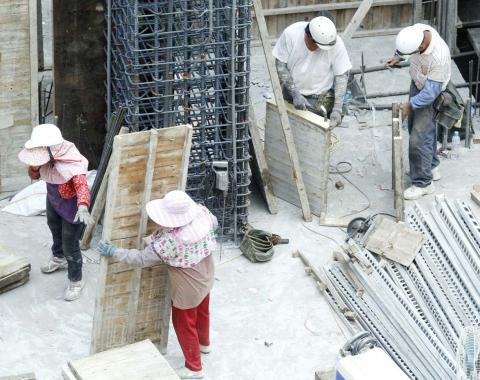The legislature yesterday revised rules to hold employers responsible for deaths from overwork, although a labor rights campaigner criticized a maximum fine of NT$300,000 (US$10,000) to be imposed on an employer as insufficient.
Following the passage of an amendment to the Labor Safety and Health Act (勞工安全衛生法), which was renamed the Occupational Safety and Health Act (職業安全衛生法) yesterday, Taiwan Association for Victims of Occupational Injuries representative Ho Kuang-wan (賀光卍) expressed skepticism over its effectiveness as a deterrent.
“The law requires an employer to pay NT$300,000 in compensation for a worker’s death resulting from excessive work. In most cases, bosses don’t care about money. If the punishment is limited to fines, there will be no deterrent effect,” Ho said.

PHOTO: CNA
Ho made the remarks at a press conference called by Democratic Progressive Party Legislator Lin Shu-fen (林淑芬), whose proposal that employers against whom death-by-overwork lawsuits are filed be given jail sentences was rejected by the legislature.
Although jail sentences were not included in the main text of the article, it was stated in the interpretation of the law that if an employee died of overwork, their employer may face charges under Article 276 of the Criminal Code for professional negligence resulting in death.
Under the law’s new articles, employers are required to take precautionary measures to prevent adverse health effects resulting from an abnormal working schedule, such as overtime and night shifts, which put unusual strain on the body.
Violations of the rules will be punishable by a fine of between NT$30,000 and NT$150,000, while employers could be fined up to NT$300,000 in the event of occupational diseases caused by working conditions that could have been prevented.
The amendment expanded the number of employees covered under the act to 10.67 million workers in all sectors, from the current 6.7 million in certain industries.
In light of a string of major work safety incidents at the Sixth Naphtha Cracker in Yunlin County’s Mailiao Township (麥寮) operated by Formosa Petrochemical Corp (台塑石化) last year, the legislature endorsed the proposed rules targeted at protecting workers in high-risk environments, such as those in the petrochemical industry, dubbed the “sixth naphtha cracker clause.”
Employers who fail to comply with workplace safety regulations and conduct regular risk assessments would be given a fine of up to NT$3 million, the law stipulated.

INVESTIGATION: The case is the latest instance of a DPP figure being implicated in an espionage network accused of allegedly leaking information to Chinese intelligence Democratic Progressive Party (DPP) member Ho Jen-chieh (何仁傑) was detained and held incommunicado yesterday on suspicion of spying for China during his tenure as assistant to then-minister of foreign affairs Joseph Wu (吳釗燮). The Taipei District Prosecutors’ Office said Ho was implicated during its investigation into alleged spying activities by former Presidential Office consultant Wu Shang-yu (吳尚雨). Prosecutors said there is reason to believe Ho breached the National Security Act (國家安全法) by leaking classified Ministry of Foreign Affairs information to Chinese intelligence. Following interrogation, prosecutors petitioned the Taipei District Court to detain Ho, citing concerns over potential collusion or tampering of evidence. The

‘FORM OF PROTEST’: The German Institute Taipei said it was ‘shocked’ to see Nazi symbolism used in connection with political aims as it condemned the incident Sung Chien-liang (宋建樑), who led efforts to recall Democratic Progressive Party (DPP) Legislator Lee Kun-cheng (李坤城), was released on bail of NT$80,000 yesterday amid an outcry over a Nazi armband he wore to questioning the night before. Sung arrived at the New Taipei City District Prosecutors’ Office for questioning in a recall petition forgery case on Tuesday night wearing a red armband bearing a swastika, carrying a copy of Adolf Hitler’s Mein Kampf and giving a Nazi salute. Sung left the building at 1:15am without the armband and apparently covering the book with a coat. This is a serious international scandal and Chinese

Seventy percent of middle and elementary schools now conduct English classes entirely in English, the Ministry of Education said, as it encourages schools nationwide to adopt this practice Minister of Education (MOE) Cheng Ying-yao (鄭英耀) is scheduled to present a report on the government’s bilingual education policy to the Legislative Yuan’s Education and Culture Committee today. The report would outline strategies aimed at expanding access to education, reducing regional disparities and improving talent cultivation. Implementation of bilingual education policies has varied across local governments, occasionally drawing public criticism. For example, some schools have required teachers of non-English subjects to pass English proficiency

TRADE: The premier pledged safeguards on ‘Made in Taiwan’ labeling, anti-dumping measures and stricter export controls to strengthen its position in trade talks Products labeled “made in Taiwan” must be genuinely made in Taiwan, Premier Cho Jung-tai (卓榮泰) said yesterday, vowing to enforce strict safeguards against “origin laundering” and initiate anti-dumping investigations to prevent China dumping its products in Taiwan. Cho made the remarks in a discussion session with representatives from industries in Kaohsiung. In response to the US government’s recent announcement of “reciprocal” tariffs on its trading partners, President William Lai (賴清德) and Cho last week began a series of consultations with industry leaders nationwide to gather feedback and address concerns. Taiwanese and US officials held a videoconference on Friday evening to discuss the